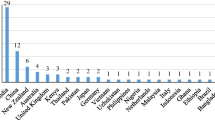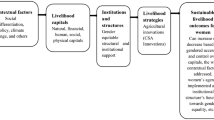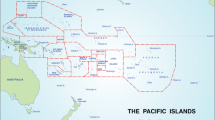Abstract
This article provides a conceptual and empirical assessment of UN brokered partnerships that seek to deepen or create inclusive and sustainable agricultural supply chains in sub-Saharan Africa. More specifically it appraises the decision-making mechanisms, processes of partnership brokerage and project implementation within the UNDP Growing Sustainable Business Initiative (GSB) in Kenya. The paper argues that the lack of bottom-up participation in decision-making mechanisms and the predominantly economic imperatives driving the GSB partnership projects have failed to reach out to the partnerships’ intended beneficiaries—Kenyan small producers of nuts and mangoes. In conclusion it is suggested that opening up the GSB platform might hold the promise of reconciling sustainable business models with (some) poverty reduction.
Similar content being viewed by others
Notes
As of mid-2008 the initiative was active in Madagascar, Tanzania, Kenya, Zambia, Malawi, Macedonia, Moldova, Mozambique, Serbia, Turkey, Cambodia, Indonesia. The GSB platforms in Ethiopia, Angola and El Salvador were abandoned.
This article derives from research material elicited for a wider research on the UN Global Compact, an initiative which is commonly portrayed as the premier global public-private partnership. Whilst conducting qualitative interviews in New York in December 2005 a number of UN civil servants suggested looking more closely at processes of partnership formation and implementation in support of the MDGs at country level. Kenya and Tanzania were identified as locations where I could investigate the politics of forums such as the UN Global Compact Local Network Kenya and one of the Compact’s ancillary initiatives—the Growing Sustainable Business Initiative.
This is not to say that the information is not accurate, sometimes it is simply not updated because of lack of personnel and resources—a commonly acknowledged problem in UN Country Offices. However, whilst conducting research on the GSB it was also found that once the partnerships database are updated ‘failed’ partnerships are removed without explanations as to why specific projects were abandoned or de-linked from the GSB.
Ronen Shamir (2004) defines these organisations as Market Non-Governmental Organisations (MaNGOs).
Historically the GEI was established by AIESEC Executives and it was co-funded by the Norwegian Agency for Development Cooperation (NORAD).
The bilateral relations between Japan and the Kenyan government dated back to the 1970s when Japan’s funding was instrumental in creating the institutions, capacities and infrastructures needed for the creation of a Kenyan market for macadamia.
Global Nuts’ main competitor.
The sustainability aspect of the project was not only relegated to ‘strict environmental and ecological guidelines’ free from chemical and pesticides (Personal Communication, Global Entrepreneurs Project Proposal, 14 July 2006), but it also envisaged recycling the nuts’ shell to use them as fuel.
Additional funding to follow up on the consultant’s recommendation was expected to come from NORAD (US$ 20,000) and Global Entrepreneurs Africa in the form of human resources (US$ 22,535).
The amounts varied depending on the distance to the collection centres and the need for cash.
GTZ, with self-funding for the project (GTZ PPP Fund), was entrusted with the responsibility of looking for more suppliers of high quality mangoes in the central districts.
KGT linked the smallholders to a Belgian wholesaler and was actively looking into donor’s fund to set up a pulp-processing factory in Malindi, at the same time it had started to evaluate the possibility of establishing a more lucrative market for dried mangoes.
References
Bäckstrand, K. 2006. Democratizing global environmental governance? Stakeholder democracy after the world summit on sustainable development. European Journal of International Relations 12(4): 467–498.
Blowfield, M. 2007. Reasons to be cheerful? What we know about csr’s impact. Third World Quarterly 28(4): 683–695.
Brown, O., and C. Sanders. 2007. Global supply chains and smallholder farmers. Trade Knowledge Network, International Institute for Sustainable Development. http://www.iisd.org/PUBLICATIONS/pub.aspx?id=851. Accessed 7 March 2008.
Bull, B., M. Bøäs, and D. McNeill. 2004. Private sector influence in the multilateral system: A changing structure of world governance? Global Governance 10: 481–498.
Bull, B., and D. McNeill. 2007. Development issues in global governance—public-private partnerships and market multilateralism. London: Routledge.
Cox, R.W. 1997. The new realism: Perspectives on multilateralism and world order. Basingstoke: MacMillian.
Day, W., S. Gandhi, and J. Giersing. 2005. UNDP’s growing sustainable business initiative: From policies to action. Alliance 10(3): 50–52.
Dolan, C. 2005. Fields of obligation—rooting ethical sourcing in Kenyan horticulture. Journal of Consumer Culture 5(3): 365–389.
Dolan, C., and J. Humphrey. 2004. Changing governance patterns in the trade in fresh vegetables between Africa and the United Kingdom. Environment and Planning A 36: 491–509.
Dolan, C., and M. Opondo. 2005. Seeking common ground: Multistakeholder initiatives in the Kenya cut flower industry. Journal of Corporate Citizenship 18: 1–12.
Freeman, A.H., F. Ellis, and E. Allison. 2004. Livelihood and rural poverty reduction in Kenya. Development Policy Review 22(2): 147–171.
Fuchs, D. 2007. Business power in global governance. Boulder, Colorado: Lynne Rienner.
Gatsby Trust. 2007. Gatsby in Africa: Building local capacities for enterprise and income generation. Occasional Paper. http://www.gatsby.org.uk/pdfs/GatsbyOP_TP_Margins.pdf. Accessed 7 March 2008.
Jenkins, R. 2005. Globalisation, corporate responsibility and poverty. International Affairs 81(3): 525–540.
McFalls, R. 2007. Testing the limits of ‘inclusive capitalism’—a case study of the South Africa HP i-community. Journal of Corporate Citizenship 28: 85–98.
Nelson, J. 2002. Building partnerships—cooperation between the United Nations system and the private sector. New York: United Nations Department of Public Affairs.
Newell, P. 2005. Citizenship, accountability and community the limits of the CSR agenda. International Affairs 81(3): 541–557.
Newell, P., and G. Frynas. 2007. Beyond CSR? Business, poverty and social justice: An introduction. Third World Quarterly 28(4): 669–681.
Odell, J.S. 2004. Case study methods in international political economy. In Models, numbers, and cases: Methods for studying international relations, ed. Detlef F. Spriz, and Yael Wolinsky-Nahmias, 56–80. Ann Arbor: University of Michigan Press.
Prahalad, C.K. 2004. The fortune at the bottom of the pyramid—eradicating poverty through profits. New Jersey: Wharton School Publishing.
Prieto-Carrón, M., P. Lund-Thomsen, A. Chan, A. Muro, and C. Bushanan. 2006. Critical perspectives on CSR and development: What we know, we don’t know and what we need to know. International Affairs 82(5): 977–987.
Reinicke, W.H., and F.M. Deng. 2000. Critical choices: The United Nations, networks and the future of global governance. Toronto: International Development Research Council.
Sandbrook, R. 2002. Growing sustainable business for poverty reduction in Tanzania. http://www.tz.undp.org/publications/GSB_introduction.ppt. Accessed 16 Sept 2007.
Shamir, Ronen. 2004. The de-radicalization of corporate social responsibility. Critical Sociology 30(3): 669–689.
Soederberg, S. 2006. Global governance in question—empire, class and the new common sense in managing north south relations. London: Pluto Press.
Thomas, C. 2000. Global governance, development and human security. London: Pluto Press.
UN Commission on the Private Sector and Development. 2004. Unleashing entrepreneurship—making business work for the poor. New York: UNDP.
UNDP. 2006. Partnering for development—making it happen. Copenhagen: UNDP Nordic Office. http://www.undp.org/partners/business/UNDP-booklet-web.pdf. Accessed 10 March 2008.
UNDP. 2007. Growing sustainable business initiative operation manual—Draft. Volume no. 1, Oct 2007. http://europeandcis.undp.org/uploads/public/File/101007_Operations_Manual_draft_final(2).pdf. Accessed 5 March 2008.
UNDP Growing Sustainable Business Initiative. 2005. Coordinating Group meeting—brief note on the outcome of the 1st Meeting. Nairobi, 26 October. Document supplied by UNDP civil servant.
UNDP Growing Sustainable Business Initiative. 2006a. Coordinating Group meeting—minutes of the 4th meeting. Nairobi, 6 June. Document supplied by UNDP civil servant.
UNDP Growing Sustainable Business Initiative. 2006b. Coordinating Group meeting—minutes of the 5th meeting. Nairobi, 17 August. Document supplied by UNDP civil servant.
UN General Assembly. 2003. Enhanced cooperation between the United Nations and all relevant partners, in particular the private sector. Report of the UN Secretary General. UN Doc. No. A/58/227, 18 August.
UN Global Compact. 2002. Global compact launches development initiative at summit. http://www.unglobalcompact.org/Issues/sustainable_development/meetings_and_workshops/Global_Compact_Launches_Development.html. Accessed 16 Sept 2007.
UN Global Compact and UNDP. 2002. Growing sustainable business for poverty reduction in Tanzania—ToR for the GSB co-ordinating group. http://www.tz.undp.org/publications/GSB_draftTOR.pdf. Accessed 20 Sept 2007.
UN Global Compact and UNDP. Growing sustainable business for poverty reduction. http://www.unglobalcompact.org/docs/issues_doc/7.3/GSB_overview.pdf. Accessed 16 Sept 2007.
Utting, P., and A. Zammit. 2006. Beyond pragmatism, appraising UN-business partnerships. Geneva: UNRISD, Market, Business and Regulation, Programme Paper no. 1.
Witte, J.M., and W. Reinicke. 2005. Business unusual—facilitating United Nations reform through partnerships. New York: United Nations Global Compact Office.
World Bank. 2005. Private sector involvement as a vital factor in achieving the millennium development goals. Washington, D.C.: The International Bank for Reconstruction and Development. http://siteresources.worldbank.org/CGCSRLP/Resources/business_mdgs.pdf. Accessed 10 March 2008.
Zammit, A. 2003. Development at risk—rethinking UN-business partnerships. Geneva: South Centre and UNRISD.
Acknowledgements
I would like to thank Peter Utting for encouraging me to write this paper, Craig Murphy, Rorden Wilkinson, two anonymous referees and the editors for providing incisive and encouraging comments. The paper also benefitted from the questions and comments made by the participants of the Symposium ‘Private Governance in the Agro-Food System’ held at the University of Münster in April 2008. Last, I would like to express my gratitude to the civil servants, farmers, businesses and NGOs that offered their time to answer my questions.
Author information
Authors and Affiliations
Corresponding author
Annex 1
Annex 1
See Table 1
Rights and permissions
About this article
Cite this article
Gregoratti, C. Global nuts and local mangoes: a critical reading of the UNDP Growing Sustainable Business Initiative in Kenya. Agric Hum Values 28, 369–383 (2011). https://doi.org/10.1007/s10460-009-9211-z
Accepted:
Published:
Issue Date:
DOI: https://doi.org/10.1007/s10460-009-9211-z




